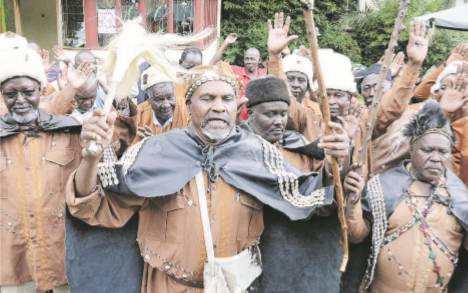
Elders from the Kikuyu community recite a prayer during their meeting in Club Heritage in Naivasha where they condemned the misuse of the community attire by politicians. They termed as an abomination the move to adorn DP William Ruto with the community traditional attire last week when some Kikuyu delegation visited him. [Antony Gitonga, Standard]
In 2018, the Presbyterian Church of East Africa caused a storm when it banned its congregation from Kikuyu traditional rites. Two years down the line, it appears that the ban only accelerated the spread of customary practice that is pulling in Kikuyu men across the social status into what is known as ‘ Kiama Kia Ma’, directly translated as the council of the truth.